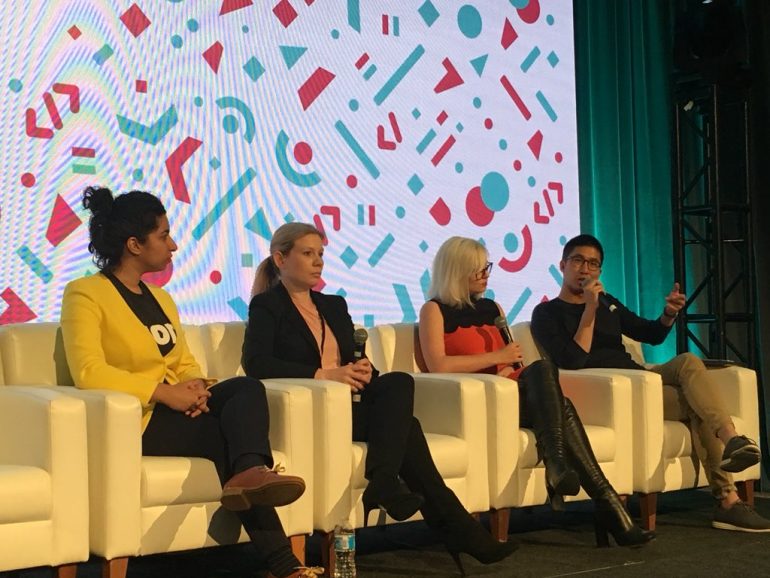Now in its second year, TribalScale’s TakeOver conference highlighted how emerging technologies are having an effect across wide-ranging industries. For the 1,200 attendees, it was a chance to get a sense of what to expect, prepare accordingly, and get insight into how other organizations are tackling their tech challenges.
As an industry that has faced some of the most intense disruption from startups, the FinTech panel looked at how technology has changed what customers expect from their bank. Most people “don’t want to be reminded of bad decisions,” said Alexandra Nuth, managing director of ATB Financial. However, technology can be used to give people advice that they want.
“Blockchain is not for the companies. Blockchain is for industries.”
– Katrin Schectman
“How can we use data to give people advice that they want, or help them be more of who they are, and not turn them into who the bank thinks that they should be?” she said. “Not pushing them into products that you think you should be—this grey-haired guy on a sailboat, not everyone has that version of success. Digital has a lot more opportunities to meet people where they are.”
Of course, there was also conversation about the ever-elusive millennial generation and how to reach them. Anna Foat, director of global digital transformation at Sun Life, said that this is the most “risk-averse” generation; having experienced a global recession and precarious employment, they have little trust in global institutions. Insurance companies haven’t figured out how to reach out to this group with these challenges in mind.
“Corporates haven’t figured out how to translate those anxieties, needs, and desires to a product they’re interested in buying. So the onus is on us to do that,” she said.
Our Prime Minister took a few minutes from #G7Summit to support the Canadian innovation ecosystem @JustinTrudeau #TOIC2018 ?? pic.twitter.com/pZ8YC1X1qO
— Jennifer K Brown (@jenkbrown007) June 11, 2018
As the rise of companies like LEAGUE show, technology is creating new expectations for products and services that people would want lumped into their insurance. For example, having Uber credits become part of a typical insurance package would interest many employees, said Manulife head of Innovation Labs Amit Bhatia.
Despite the pressure to get ahead of these trends, the panel cautioned against jumping onto a new technology so quickly that you end up building something consumers aren’t ready for.
“One example is voice banking—we did test it—and a lot of consumers were like, ‘Okay you can do voice banking and that’s great, but can you just get me a card in 24 hours or can you get me access to my money or self-service fraud? Those are things that actually affect my day to day. Don’t throw sexy technology at me that I’m not going to use,’” said Nuth.
Another emerging technology that the conference explored in-depth was blockchain. Many companies are considering how they’re going to leverage the blockchain, and what the legal ramifications might be.
Rahma with tears of joy after receiving her pair of @eSightEyewear to help her see! Thank you to everyone who purchased your ticket! Your contribution went towards this gift for Rahma. ??? #TogetherWeSee pic.twitter.com/8asnZC1cJF
— TribalScale (@TribalScale) June 11, 2018
Brian Wong, CEO and co-founder of Kiip, told companies in the audience not to let “looming legal fear” keep them from looking into blockchain use cases. However, he warned against making it the main theme of the business. In the same way that companies on the cloud don’t describe themselves as cloud businesses, blockchain is similarly an enabler.
“Blockchain is not for the companies. Blockchain is for industries,” said Katrin Schectman, principal architect at Thomson Reuters.
While startups have a reputation for being the disrupters, Foat said that there is a reach enterprises have that startups can take advantage of, and both sides need to work better together.
“In academia, you can’t just be theoretical. The rubber needs to hit the road for business. For startups, really think about how to position what it is that they’re doing in a way that a big company can consume it,” said Foat. “And of course, corporations acting in a way that’s not easy for startups to work with us. [But] it’s not just corporate that needs to morph a little bit. Startups can’t expect to pick up the phone and say ‘I have this amazing idea and I need to speak to the CEO of Manulife’. In academia it’s easy to say ‘here are the trends in five years’ but if it’s absent what it actually means commercially, it’s not interesting for business. So all three of those players need to see each other and figure out a way to come together.”
Feature photo via Twitter.


